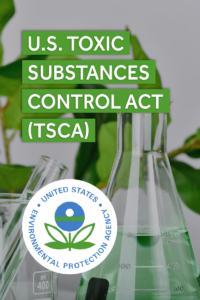Toxic Substances Control Act (TSCA)
November 22, 2023 | Written by GreenSoft Technology, Inc.
EPA Makes Changes to Rules Regarding PBT Chemicals Regulated Under TSCA
 Changes to scope, exclusions, and deadlines regarding the use of PIP (3:1) and decaBDE
Changes to scope, exclusions, and deadlines regarding the use of PIP (3:1) and decaBDE
On November 16, the U.S. Environmental Protection Agency (EPA) released a pre-publication notice of proposed changes to the rules for Persistent, Bioaccumulative, and Toxic (PBT) chemicals regulated under the U.S. Toxic Substances Control Act (TSCA).
Among other changes, the proposed new rules affect the scope of the regulation, the various industry exclusions or exemptions, and the deadlines for compliance. Many producers of electronic equipment will be impacted by the changes included in the proposal.
The proposed changes to the TSCA regulation come after the EPA released final rules on January 6, 2021 to reduce exposures to five PBT chemicals. In 2021, the EPA announced that it was reviewing these rules in light of Executive Orders and other guidance provided by the Biden-Harris Administration. And in March 2022, the EPA extended the enforcement deadline for PIP (3:1) compliance to October 2024.
The proposed changes to the rules only apply to PIP (3:1) and DecaBDE prohibitions, and do not impact the other three PBT substances restricted under 40 CFR Part 751 Subpart E. All existing prohibitions on 2,4,6-Tris(tert-butyl)phenol (2,4,6-TTBP), Hexachlorobutadiene (HCBD), and Pentachlorothiophenol (PCTP) will remain unchanged and in force.
The EPA‘s announcement of the proposed changes can be found here. The full text of the pre-publication of the regulation can be found here. GreenSoft Technology has created a red-lined version of the amended regulation text so that readers can see the changes between the old and new versions. Download our red-lined version of the regulation here.
Notable changes affecting electronic equipment
Some notable changes affecting the electronics industry are included in the proposed new rule. Changes affecting electronic equipment, which involve PIP 3:1 only, include, but are not limited to:
- A permanent exclusion has been provided for the use of PIP (3:1) in products manufactured for use in circuit boards and wire harnesses. As such, many electronic components will no longer be in scope. However, this applies to PCB assemblies only. Enclosures, pumps, motors, fasteners, and other items which are not specifically intended to be used on a circuit board would still be in scope.
The specific definition of what constitutes “used in circuit boards” remains undefined. Interested parties are encouraged to submit their questions and concerns to the EPA during the comment period, as explained below, to request clarification.
- The exclusion of the use of PIP (3:1) in lubricants and grease from the regulation has been narrowed. PIP (3:1) will now only be excluded from restrictions when used in lubricants and grease used for aerospace and turbines.
For all other applications of PIP (3:1) in lubricants and grease, there will be a five-year period until the prohibition takes place. Manufacturers of hard drives and other products with precision motors may be impacted, and should evaluate their supply chain to check for the presence of PIP (3:1).
- The exclusion of the use of PIP (3:1) in motor vehicle parts has been removed and replaced with non-permanent exemptions. The exemptions expire in 15 years for new vehicles and parts for new vehicles (including heavy machinery), and expire in 30 years for replacement parts for vehicles and heavy machinery.
- The exclusion of the use of PIP (3:1) in aerospace manufacturing has been removed and replaced with a 30-year exemption. Although the exemption has a 30-year applicability period, manufacturers supplying products and components to the aerospace industry may begin to see concern over the restriction sooner due to the long lifespans of aerospace products.
- A 10-year exemption has been provided for the use of PIP (3:1) in manufacturing equipment as well as equipment used in the semiconductor industry.
Proposed changes for the use of PIP (3:1)
For PIP (3:1), a complete summary of the proposed revisions to the 2021 PBT final rule is provided below:
- Require the use of PPE for the domestic manufacturing and processing of PIP (3:1) and some PIP (3:1)-containing products and articles, codifying existing practices, including at least a NIOSH-approved respirator with an APF of 10 and gloves that are chemically resistant to PIP (3:1);
- Require the use of engineering controls and PPE for the use of PIP (3:1) as an intermediate in the manufacturing of cyanoacrylate adhesives, codifying existing practices, including at least a NIOSH-approved respirator with an APF of 50 and gloves that are chemically resistant to PIP (3:1);
- Narrow the scope of the exclusion for lubricants and greases to aviation and turbine uses, with a 5-year phased-in prohibition for all other uses (as noted above);
- Add new exclusions for use in wire harnesses and electric circuit boards (as noted above);
- Replace the exclusion for new and replacement parts for motor vehicles with a 15-year phased-in prohibition for new parts and an additional 15 years for replacement parts (as noted above);
- Replace the exclusion for new and replacement parts for aerospace vehicles with a 30-year phased-in prohibition for new parts and until the end of the service life of the vehicle for replacement parts (as noted above);
- Extend the compliance timeframe for an additional 10 years for use in manufacturing equipment and in the semiconductor industry (as noted above);
- Add a new 5-year compliance timeframe deadline for processing and distribution of PIP (3:1) for use as an inert ingredient in a Federal Insecticide, Fungicide, and Rodenticide Act-approved antifouling paint coating for U.S. Navy applications, and
- Modify existing recordkeeping requirements and require records associated with the workplace protection requirements.
Proposed changes for the use of decaBDE
For decaBDE, a complete summary of the proposed revisions to the 2021 PBT final rule is provided below:
- Require a label on existing plastic shipping pallets that are known to contain decaBDE;
- Require the use of personal protective equipment (also referred to as “PPE”) for some activities involving decaBDE, codifying existing practices, including a NIOSH-approved N95 respirator with an assigned protection factor (APF) of 10 and gloves that are chemically resistant to decaBDE;
- Prohibit releases to water during the manufacturing, processing, and distribution in commerce of decaBDE, decaBDE-containing products, and require all persons to follow any applicable regulations and best management practices for preventing the release of decaBDE;
- Extend the compliance date for processing and distribution in commerce of decaBDE-containing wire and cable insulation for use in nuclear power generation facilities;
- Require export notification for decaBDE-containing wire and cable for use in nuclear power generation facilities; and
- Modify existing recordkeeping requirements and require records associated with the workplace protection requirements.
Next steps and comment period
The proposed changes are currently in “pre-publication” status. The pre-publication of the updated rule has been provided for the convenience of interested parties. The EPA is expected to published the official version of the proposed rule in the Federal Register in the coming days.
The EPA will accept comments for a 45-day period after the proposed rule is posted to the Federal Register. During the comment period, interest parties can submit comments online by navigating to https://www.regulations.gov/ and searching for Docket Number EPA-HQ-OPPT-2023-0376. GreenSoft Technology will continue to track the development and progress of the regulation, and keep readers updated on our blog.
GreenSoft Technology strongly encourages companies impacted by these rules to utilize the 45-day comment period to submit any comments or questions to EPA. Such input will allow EPA to take efforts to clarify any open concerns or questions prior to publication of the final rule.
GreenSoft Technology helps with TSCA supply chain data collection
GreenSoft Technology can help companies affected by the TSCA regulation by collecting substance data on all parts within their products to ensure that none of the restricted PBT substances are present.
As part of our TSCA data services, we will contact your supply chain to collect data on the presence of PIP 3:1, decaBDA, and/or all five PBT substances in your products. We will guide your suppliers to help them collect the necessary information that you need if they do not already have the information available.
We contact your suppliers as many times as it takes to obtain complete and accurate data, and provide you with compliance reports and substance analysis for your products, which you can use to ensure your products are in compliance with TSCA.
Contact us to learn more.





